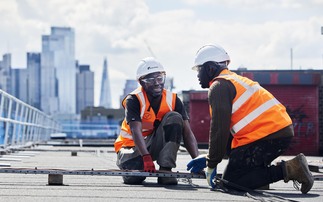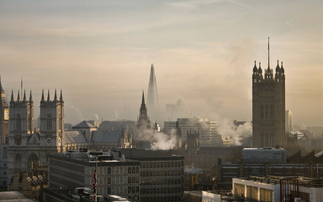Environmental Industries Commission executive director Matthew Farrow and WSP director of sustainability David Symons talk to BusinessGreen about Pledge to Net Zero, the campaign to get the UK's environmental services industry to back science-based emissions reductions.
The government's net zero target, which is set to celebrate its first birthday this weekend, has played a critical role in encouraging businesses across the country to revisit and firm up their sustainability ambitions, according to Matthew Farrow, executive director of the Environmental Industries Commission (EIC).
The shift to net zero has been "quite a psychological one", he reflects. "When we had the 80 per cent target, there was the general feeling in business that as long as things were going generally in the right direction, we were all playing our part. Whereas with the net zero target, there is really nowhere to hide. Every single sector has to leave no stone unturned in terms of innovation, motivation, and playing its part."
This, of course, includes the EIC's membership from across the UK's environmental services sector, which Farrow stresses must "walk the talk" and implement ambitious corporate sustainability goals that align with the government's plan to reduce greenhouse gas emissions to zero within 30 years.
That is why the EIC helped found - along with business consultancies WSP and AECOM as well as a number of other industry groups - the Pledge to Net Zero, an environmental sector campaign that asks signatories to commit themselves to delivering on science-based emissions targets that are in line with the UK's net zero goal.
Launched more than six months ago, in a different era, before the first recorded case of the coronavirus and when the prospect of the worst global economic recession in decades seemed remote, some 50 firms in the environment sector have now signed up to the pledge.
While in theory it seems only logical that a sector that specialises in environmental services should demonstrate best practice when it comes to corporate sustainability ambition, in practice the target requires a large segment of the UK's economy to adjust their approach to business. The environmental services sector employs 373,000 people in the UK and generates some £61bn in annual revenue, or roughly 1.6 per cent of the UK's GDP, according to EIC stats.
Farrow spoke to BusinessGreen in early June, just days after the government had confirmed its plans to officially reschedule the UN COP26 climate conference to November 2021, bowing to the inevitable in the face of the coronavirus crisis. He was joined by David Symons, director of sustainability at environmental services firm WSP, another founding signatory of the Pledge to Net Zero.
The initiative was officially relaunched in late May, in a bid to galvanise yet more industry players to up their sustainability commitments despite the challenges presented by the unfolding coronavirus crisis.
And despite undeniably fraught times for all sectors across the economy, Symons and Farrow said that that momentum behind the initiative is building. Three new members had joined just the morning of their interview with BusinessGreen, they said.
The plan now is to entice even more businesses, large and small to the fold over the coming year in order to position the environmental services sector as an exemplar industry ahead of the rescheduled COP26 Climate Summit in Glasgow.
"Now we have the date for COP, we'd very much like the industry to be seen as one of the leading sectors as we come towards COP," Symons says. "I think having that date has also acted as quite a good spur for our industry."
The Pledge to Net Zero, which Farrow and Symons explain was developed to be as "light-touch" and "admin-lite" as possible, holds signatories to three promises. Participating firms must commit to reduce their emissions in line with climate science and the Paris Agreement's goals; to publicly report on their emissions progress; and finally to publish each year one piece of research or thought leadership that provides practical advice on how to deliver a net zero economy. To hold up its end of the deal, WSP recently published a net zero essay collection with centre-right think tank Bright Blue that collated insights and expertise from a range of different UK firms, politicians, academics and actors.
The pledge's parameters were kept simple, Symons and Farrow explain, in order to encourage companies of all sizes to participate and prevent marginalising smaller organisations. "We want it to be inclusive and help companies learn from each other rather than it being a very complicated, burdensome programme that is only applicable to the elite," Symons explains.
So far the initiative appears to have succeeded in its stated aim, attracting a varied mix of signatories, from boutique two-person consultancies, to big brands with thousands of employees. Two of the pledge's founding members, WSP and AECOM, together boast 15,000 employees in the UK alone.
Farrow and Symons agree the coronavirus has delivered a mixed bag to the environmental services and consultancy sector. Site shutdowns have disrupted businesses and many of the sector's private sector clients have cut discretionary spend. "Many companies have had a tough time," Farrow notes. "Some more than others, but particularly those working with private sector clients."
But despite the short-term economic damage wrought by the pandemic, both are hopeful that, in the long-term, the experience will encourage policymakers to engage more quickly, radically, and forcefully with the environmental agenda.
"It has opened people's minds to make them more flexible in their thinking about what is possible," Farrow explains. The funding fast-tracked by the government to local authorities to pilot new active travel infrastructure in April is evidence of this shift in thinking already at work, he says.
Furthermore, cleaner air, coal-free electricity, decongested city streets, and crashing oil markets have all demonstrated how fundamentally environmental issues are intertwined with public health concerns and economic resilience - a boon for those, like Farrow, who have long lobbied for a more integrated approach to environmental and economic policies.
"Over the last three to four years, there's been much more consciousness and understanding that these issues [air quality, recycling, climate change'] go together and have to be tackled together." he observes. "I think Covid is building on that and making people think harder about the social resilience and public health side of some of this stuff."
Similar mechanics are at work in the private sector, according to Symons, who is hopeful that a greater awareness of climate and environmental issues will prompt firms to reassess and boost their sustainability strategies.
"The Covid-19 crisis has given license for people to ask bolder questions than they would have dared asked before," he says. Both WSP itself and the corporates it works with are now overhauling their approach to what constitutes necessary business travel, for example. "Previous red lines have been busted," he says. "I've been working with a client on a 'smarter working programme' and all of the reasons of why it was impossible to reduce travelling have been completely shown to be false."
This is significant, he stresses, given that historically, the largest chunk of the environmental services sector's carbon emissions has been travel-related. It follows that employers' new-found receptiveness to remote working and digital conferencing will have a significant impact on their overall emissions.
"Travel has traditionally been a much more challenging area to crack than building emissions," Symons explains. "Because a property team can look at building emissions. Transport emissions require the buy in of absolutely everybody, to change their ways of working."
Looking to the future, Farrow would like the government's forthcoming economic recovery package to focus on reskilling workers to deliver the mass programme of housing retrofits that will be necessary for the UK to deliver its net zero ambition. He also argues that it is imperative that the National Infrastructure Strategy, when it is finally published, is fully compatible with the government's net zero goal.
The government has signalled it is keen to advance climate action through its recovery plans, with reports suggesting carbon capture and storage, building upgrades, green hydrogen, and electric vehicle infrastructure could all enjoy a boost in the stimulus package that is expected to be published next month.
The mood music in Whitehall is encouraging for the environmental services sector and suggests significant new investment could flow towards low carbon infrastructure in the coming months. But for his part, Symons suggests the government should accompany any funding boost with reforms that give more power to local authorities to deliver on their net zero plans.
"Local government is champing at the bit to lead on net zero delivery in their areas, they are well equipped to do that," he says. "It's an underpowered area for government to draw from. In all of this - from domestic retrofit, to changing mobility habits, to supporting EV charging networks - my ask [to the government] is: Give local authorities the power and the dosh to be able to crack on and lead delivery of this in their areas."
Symons also warns that over the months to come, both the private sector and government need to plan carefully in order to capitalise on the opportunities provided by the unprecedented times that everyone is now facing.
"Every organisation, from those that have signed up to the Pledge to government, needs to have a plan, because there is just a natural tendency that people will bounce back to what they have always done previously," he counsels. "And if you don't have a specific plan, and that plan isn't implemented fast enough, then we'll bounce back and have lost the opportunity."
The Net Zero Leadership Hub is brought to you in partnership with BT, as part of its support for the Net Zero Leadership Stream at the world's first Net Zero Festival this autumn. All the content on the Hub is fully editorially independent unless otherwise stated.
You can find out more about the Net Zero Festival and reserve your place here.








